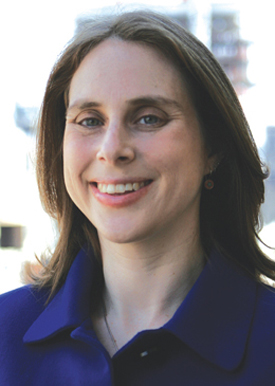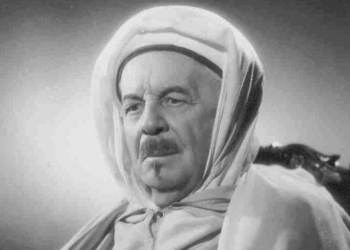Rabbi Jill Jacobs will lead discussion on social justice in a time of economic crisis during a community lecture at the University of St. Thomas on Feb. 7
By ERIN ELLIOTT BRYAN / Community News Editor
Rabbi Jill Jacobs grew up just outside of Boston, Mass., in a Jewish family that had a strong commitment to social justice. She went on to Columbia University, where she intended to pursue journalism, and became involved in some Jewish organizations as well as in social justice work.
But the two areas just didn’t seem to work together.
“I had no sense that the two of them could come together in any way,” Jacobs recalled, during a phone conversation with the AJW last week.
Along the way, Jacobs decided she wanted to be a rabbi. While studying at the Jewish Theological Seminary (JTS) in New York City, she began working on tenant organizing in central Harlem. It was there that she made a connection.
“Eventually I started doing some research and started looking up what Jewish texts might say about landlord/tenant issues. I found out that the ancient rabbis were talking about the same issues I was seeing in Harlem,” Jacobs said. “That’s when it came together for me that I could be a rabbi who devoted myself to doing social justice.”
Jacobs, 35, who was named to Newsweek’s list of the 50 most influential rabbis in 2009 and 2010, will present “Pursuing Social Justice in a Time of Economic Crisis” on Feb. 7 at the University of St. Thomas. Following her lecture, responses will be provided by executive directors Vic Rosenthal, of Jewish Community Action (JCA); Doran Schrantz, of ISAIAH; and Hashi Shafti, of Somali Action Alliance.
The event is sponsored by the Jay Phillips Center for Interfaith Learning, and is free and open to the public.
 Rabbi Jill Jacobs: There are a lot of Jewish texts that we can apply in thinking about how to work our way out of this economic crisis. (Photo: Courtesy of Jay Phillips Center for Interfaith Learning)
Rabbi Jill Jacobs: There are a lot of Jewish texts that we can apply in thinking about how to work our way out of this economic crisis. (Photo: Courtesy of Jay Phillips Center for Interfaith Learning)
“I’m going to be talking about what wisdom Judaism brings to contemporary issues. I’m going to be looking at some economic and social issues in America through a Jewish lens, and making the argument that we need to bring Jewish wisdom into the public sphere,” Jacobs said. “I’m going to suggest that there are a lot of Jewish texts that we can apply in thinking about how to work our way out of this economic crisis.”
Jacobs will serve as the Jay Phillips Center’s rabbi-in-residence Feb. 7-10 at both St. Thomas and St. John’s University in Collegeville, Minn. As rabbi-in-residence, she will offer lectures, teach classes and meet with various groups at both schools.
The two universities co-sponsor the center, whose mission is to promote interfaith learning and friendship among people of various religions.
“A lot of times, we’re very insistent on the separation of church and state, and that’s right when religion is used to inhibit some people’s actions,” Jacobs said. “I do think that religion can be helpful in the public sphere, when we bring our religious wisdom into conversations about how things should happen in America, and also when we’re open to listening to other people.”
Jacobs said each of the three major religions has something to contribute to the contemporary debate about social justice issues.
“I don’t believe that we need to say Judaism has all of the answers, Christianity doesn’t have all the answers, Islam doesn’t have all the answers,” she said. “A real public conversation in America has to look at all of this wisdom.”
When Jacobs was ordained by JTS in 2003, there was no model for Judaism and social justice. But she took a job in Chicago as the director of outreach and education for the Jewish Council on Urban Affairs, where she worked to engage the local Jewish community in the organization’s efforts.
Jacobs is the founding director of Ma’aseh: The Center for Jewish Social Justice Education. She is the author of There Shall Be No Needy: Pursuing Social Justice through Jewish Law and Tradition (Jewish Lights Publishing) and the forthcoming Where Justice Dwells: A Hands-on Guide to Doing Social Justice in Your Jewish Community.
For those who are interested in social justice issues, Jacobs recommended getting their synagogue or school involved in community coalitions, such as JCA, that are working on local or national advocacy issues. She also suggested talking about their social justice work with others and explaining why, as Jews, they are drawn to that work.
“In our educational institutions and our synagogues, we need to talk social justice as something that Jews do,” Jacobs said. “It’s as central to Judaism and to Jewish life as Shabbat or going to synagogue or keeping kosher.”
***
Rabbi Jill Jacobs will present “Pursuing Social Justice in a Time of Economic Crisis” 7:30 p.m. Monday, Feb. 7 in the Owens Science Center 3M Auditorium at the University of St. Thomas in St. Paul. It is free and open to the public.
For information, contact the Jay Phillips Center for Interfaith Learning at 651-962-5780 or visit: www.stthomas.edu/jpc.
(American Jewish World, 2.4.11)








 Rabbi Jill Jacobs: There are a lot of Jewish texts that we can apply in thinking about how to work our way out of this economic crisis. (Photo: Courtesy of Jay Phillips Center for Interfaith Learning)
Rabbi Jill Jacobs: There are a lot of Jewish texts that we can apply in thinking about how to work our way out of this economic crisis. (Photo: Courtesy of Jay Phillips Center for Interfaith Learning)









